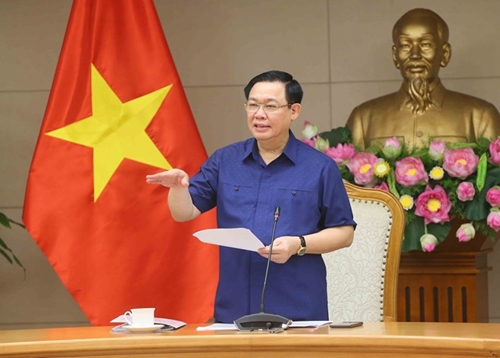He made the assessment at a meeting of the Steering Committee for Price Management in Hanoi on July 3.
The committee reported that during the first half of 2019, prices soared in January and February as the nation prepared for the Lunar New Year holiday, but decreased slightly in March before gradually rebounding in the two following months, and then declined again in June.
The Consumer Price Index (CPI) in June fell 0.09 percent from the previous month. During the first six months, it grew 2.64 percent compared to the same period last year, which was a three-year low and far below the ceiling rate of 4 percent set by the National Assembly.
    |
 |
|
Deputy Prime Minister Vuong Dinh Hue speaks at the meeting of Steering Committee for Price Management in Hanoi on July 3 |
The CPI developments in the reviewed period relatively matched the forecast made at the year’s beginning, the committee said.
Noting factors helping to curb the CPI expansion, experts said while grain food prices decreased thanks to abundant supply and lower rice import demand in the world, pork prices plunged between March and May due to the African swine fever epidemic. Additionally, prices of healthcare services fell 0.1 percent from December 2018, and domestic petrol prices have also dropped again since the latter half of May.
Ministries, sectors and localities have coordinated closely to ensure the supply-demand balance, adjust prices of State-managed commodities in an appropriate manner, and steer exchange rates basing on the flexible daily reference exchange rate mechanism.
Recognizing the outcomes, Deputy PM Hue, who is also chairman of the Steering Committee for Price Management, underlined the resolve to keep inflation at 3.3 – 3.9 percent this year.
He asked the committee to continue keeping a close watch on the supply-demand situation to take suitable solutions to stabilize the market, especially in terms of essential goods like pork, construction materials and petrol. While the fiscal policy must be governed in a strict manner, the monetary policy needs to be flexible and be coordinated with other macro-economic policies to keep inflation within the ceiling limit.
The core inflation this year should be kept within some 1.8 percent, he noted.
Hue asked ministries, sectors and localities to provide information about price management to relevant agencies, the media and the public in a timely fashion. They also need to increase the transparency of statistics relating to important commodities affecting people’s life.
At the meeting, Deputy Minister of Agriculture and Rural Development Tran Thanh Nam also reported by July, the African swine fever had been reported in 61 of the 63 provinces and cities, with only Ninh Thuan and Tay Ninh provinces still free from any outbreaks.
More than 2.8 million pigs weighing over 180,000 tons have been culled. The amount of live pigs sold to the market in the six months was estimated at over 1.8 million tons, down 4.7 percent year on year.
The ministry is directing the implementation of drastic solutions to prevent the epidemic from spreading further. It has also assigned relevant agencies to work with companies to develop vaccine against the virus, Nam added.
Source: VNA